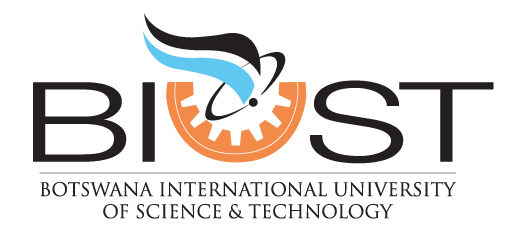The Botswana International University of Science and Technology (BIUST) was privileged to host the Assistant Minister of Justice and Correctional Services, Honourable Augustine Nyatanga, accompanied by Ms. Thobo Letlhage, Director of Refugee Affairs and Anti-Human Trafficking, and Ms. Gorata Seleka, Private Secretary to the Minister. The visit underscored the importance of institutional collaboration in addressing national development goals, particularly in the areas of justice, social inclusion, and innovation.
In his welcome remarks, Vice Chancellor Professor Otlogetswe Totolo highlighted social relevance as one of the University’s foundational pillars. He emphasized the university’s commitment to engaging with key stakeholders to co-develop practical solutions to community challenges. Among the initiatives shared was BIUST’s ongoing dialogue with the Botswana Development Corporation (BDC) to establish a drone technology manufacturing plant, with the aim of mass-producing drones for nationwide delivery of medical supplies, a model successfully piloted in remote areas of Botswana. Furthermore, the Vice Chancellor shared that BIUST is exploring opportunities for drone exports as a strategy for revenue generation and regional innovation leadership.
In his address, Hon Nyatanga reiterated the government’s dedication to ensuring inclusive development, particularly for marginalized groups such as refugees housed at Dukwi Refugee Camp. He noted that the government is currently reviewing legislation to enhance access to essential services, including education, for refugees. One of the proposed reforms will allow refugee children to access scholarships abroad using Botswana-issued identification documents, helping to bridge the educational gap for displaced communities.
The Assistant Minister also shared updates on advanced discussions regarding the potential naturalization of long-term refugees—specifically those who have lived in Botswana for over 17 years and have contributed positively to society. Additionally, he discussed proposed corrections reforms aimed at empowering incarcerated individuals. These include policies that would enable inmates to prepare their own meals and commercialize surplus food production, with proceeds supporting the daily operations of correctional institutions.
Responding to the issue of educational access for refugees, Professor Totolo reaffirmed BIUST’s role in supporting national priorities through inclusive higher education. He cited the graduation of three refugee students in 2023, who completed degrees in Computer Science, Telecommunications, and Biological Sciences under full scholarships—covering tuition, accommodation, a living stipend, and textbook allowances. BIUST is currently hosting five refugee students from Somalia, the Democratic Republic of Congo, Zimbabwe, and Burundi, who are also studying under full sponsorship.
The BIUST leadership commended the government for its progressive policies towards refugee integration and reaffirmed the University’s commitment to supporting these efforts. Through targeted academic programs and scholarship opportunities, BIUST aims to empower displaced youth and contribute to a more inclusive and knowledge-driven society.
In her closing remarks, Ms. Thobo Letlhage, Director of Refugee Affairs and Anti-Human Trafficking, expressed gratitude to BIUST for its continued support of refugee students. She emphasized the importance of issuing passports to refugee learners, which would facilitate access to international scholarships and internship opportunities, further enhancing their educational and professional development.
The courtesy visit reinforced the shared commitment between government and academia to fostering inclusive growth, innovation, and social transformation in Botswana and beyond.
